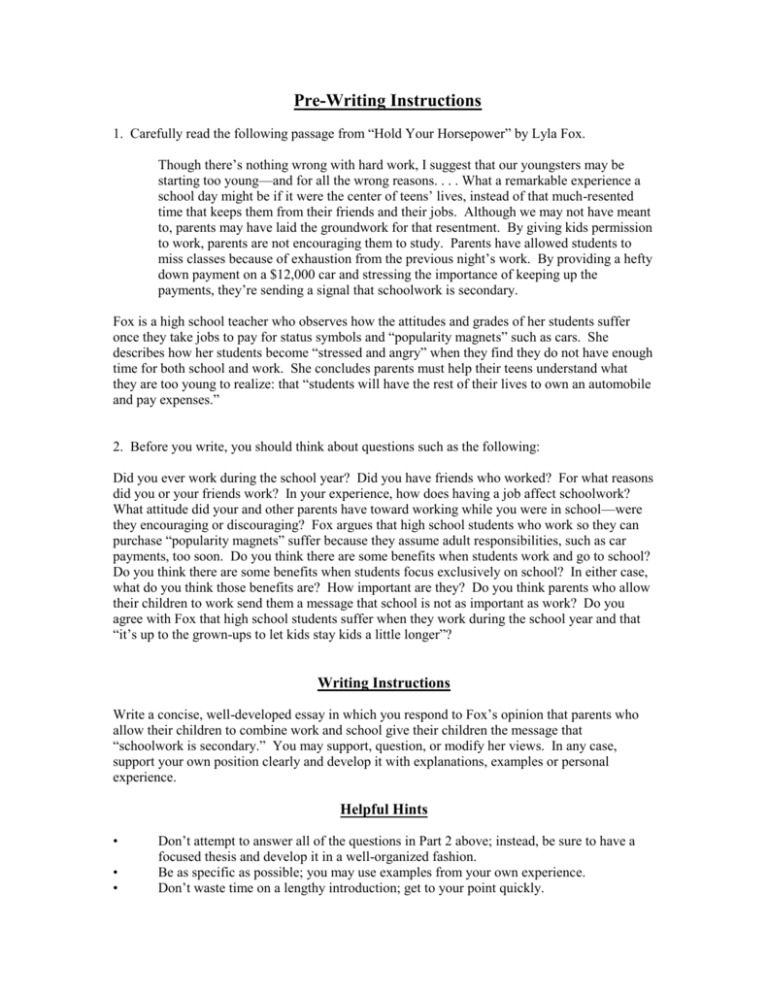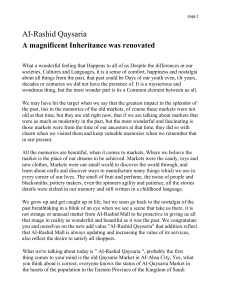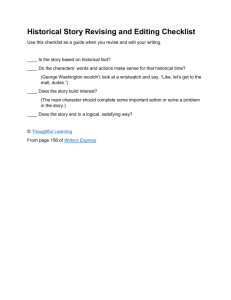Pre-Writing Instructions - University of Illinois Archives
advertisement

Pre-Writing Instructions 1. Carefully read the following passage from “Hold Your Horsepower” by Lyla Fox. Though there’s nothing wrong with hard work, I suggest that our youngsters may be starting too young—and for all the wrong reasons. . . . What a remarkable experience a school day might be if it were the center of teens’ lives, instead of that much-resented time that keeps them from their friends and their jobs. Although we may not have meant to, parents may have laid the groundwork for that resentment. By giving kids permission to work, parents are not encouraging them to study. Parents have allowed students to miss classes because of exhaustion from the previous night’s work. By providing a hefty down payment on a $12,000 car and stressing the importance of keeping up the payments, they’re sending a signal that schoolwork is secondary. Fox is a high school teacher who observes how the attitudes and grades of her students suffer once they take jobs to pay for status symbols and “popularity magnets” such as cars. She describes how her students become “stressed and angry” when they find they do not have enough time for both school and work. She concludes parents must help their teens understand what they are too young to realize: that “students will have the rest of their lives to own an automobile and pay expenses.” 2. Before you write, you should think about questions such as the following: Did you ever work during the school year? Did you have friends who worked? For what reasons did you or your friends work? In your experience, how does having a job affect schoolwork? What attitude did your and other parents have toward working while you were in school—were they encouraging or discouraging? Fox argues that high school students who work so they can purchase “popularity magnets” suffer because they assume adult responsibilities, such as car payments, too soon. Do you think there are some benefits when students work and go to school? Do you think there are some benefits when students focus exclusively on school? In either case, what do you think those benefits are? How important are they? Do you think parents who allow their children to work send them a message that school is not as important as work? Do you agree with Fox that high school students suffer when they work during the school year and that “it’s up to the grown-ups to let kids stay kids a little longer”? Writing Instructions Write a concise, well-developed essay in which you respond to Fox’s opinion that parents who allow their children to combine work and school give their children the message that “schoolwork is secondary.” You may support, question, or modify her views. In any case, support your own position clearly and develop it with explanations, examples or personal experience. Helpful Hints • • • Don’t attempt to answer all of the questions in Part 2 above; instead, be sure to have a focused thesis and develop it in a well-organized fashion. Be as specific as possible; you may use examples from your own experience. Don’t waste time on a lengthy introduction; get to your point quickly. Pre-Writing Instructions 1. Carefully read the following passage from “Making the Grade” by Kurt Wiesenfeld. Time was, when you received a grade, that was it. You might groan and moan, but you accepted it as the outcome of your efforts or lack thereof (and, yes, sometimes a tough grader). In the last few years, however, some students have developed a disgruntledconsumer approach. If they don’t like their grade, they go to the “return” counter to trade it in for something better. What alarms me is their indifference toward grades as an indication of personal effort and performance. . . . Grades can be traded for what has value: a degree, which means a job, which means money. Wiesenfeld, a professor of physics, has noticed an increase in the number of students who want him to change their final grades. Wiesenfeld contends that students sometimes forget that grades should be based on the quality of the work they submit and instead think of grades as important because they can be “traded” for what is valued by society: “a degree, which means a job, which means money.” He argues that students are affected by the “superficial values” saturating our society such as the desire for wealth and success. He concludes that such values make the love of knowledge for its own sake “irrelevant” to learning. 2. Before you write, you should think about questions such as the following: Have you ever received a grade that was lower than what you expected? Have you ever asked a teacher to reconsider a grade? How have other people you know treated grades? In your experience, what do grades mean? Students are under increasing pressure to get good grades, which Wiesenfeld claims are “traded” for what is valued in American society. Where do you think this pressure comes from: yourself, parents, teachers, colleges and university admissions boards? Do you think that there should be less of an emphasis on grades? If so, why? If not, why not? What qualities do you think grades should reflect? For example, do you think they should reflect effort? Do you agree with Wiesenfeld’s claim that the trend of students asking for grades to be changed reflects the “superficial values saturating our society”? Writing Instructions Write a concise, well-developed essay in which you respond to Wiesenfeld’s opinion that grades and the “surface values” they represent have become more important than knowledge for its own sake. You may support, question, or modify his views. In any case, support your own position clearly and develop it with explanations, examples or personal experience. Helpful Hints • • • Don’t attempt to answer all of the questions in Part 2 above; instead, be sure to have a focused thesis and develop it in a well-organized fashion. Be as specific as possible; you may use examples from your own experience. Don’t waste time on a lengthy introduction; get to your point quickly. Pre-Writing Instructions 1. Carefully read the following passage from “Kids in the Mall” by William Kowinski. Teenagers in America now spend more time in the mall than anywhere else but home and school. Mostly it is their choice, but some of that mall time is put in as the result of twopaycheck and single-parent households, and the lack of other viable alternatives. But are these kids being harmed by the mall? . . . Kids spend so much time at the mall partly because their parents allow it and even encourage it. The mall is safe, it doesn’t seem to harbor any unsavory activities, and there is adult supervision; it is, after all, a controlled environment. . . .The mall encourages passivity and consumption, as long as the kid doesn’t make trouble. Therefore all they learn about becoming adults is how to act and how to consume. Kowinski observes that the mall is a “common experience for the majority of American youth” because they have “probably been going there all their lives.” He claims that although the mall sometimes functions as a “babysitter” for busy parents, the mall does have its benefits: adolescents have an opportunity to spend time together without interruption from adults. On the other hand, Kowinski argues young adults are coming of age in an “high-consumption society,” and the mall adds pressure to their lives by making them self-conscious about what to buy and wear in order to be popular. He contends that because teens and young adults spend so much of their time at the mall, they assume that “the goal of life is to make money and buy products.” 2. Before you write, you should think about questions such as the following: Have you or your friends spent a lot of time at malls? What kinds of activities have you seen teens and young adults engaging in at the mall? In your experience, what purpose has the mall served in your life, or in the lives of your friends? Do you think shopping malls influence the behavior and self-image of teens and young adults? Why or why not? Kowinski argues that “mall kids” are “preprogrammed to become consumers” and that the mall creates “lifelong shoppers.” Do you think that the mall teaches young adults to be consumers? If so, is that a problem? Why or why not? If not, can you think of other lessons young adults might learn at the mall? Do you agree with Kowinski’s claim that the mall has generally negative effects on young adults because it “encourages passivity and consumption”? Writing Instructions Write a concise, well-developed essay in which you respond to Kowinski’s opinion that shopping malls can be harmful because they encourage young adults to be passive consumers. You may support, question, or modify his views. In any case, support your own position clearly and develop it with explanations, examples or personal experience. Helpful Hints • • • Don’t attempt to answer all of the questions in Part 2 above; instead, be sure to have a focused thesis and develop it in a well-organized fashion. Be as specific as possible; you may use examples from your own experience. Don’t waste time on a lengthy introduction; get to your point quickly.






